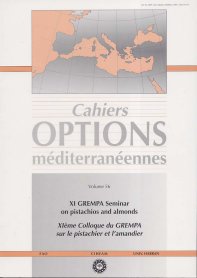| Article précédent | p. 197-200 | Article suivant |
The effect of glyphosate and herbicide combinations on pistachio garden weeds in kerman
The type of design was randomized complete blocks with 8 treatments and 4 replications per treatment. All treatments received 300 ml per ha of citowett spreader. Glyphosate combinations were applied once (mid July) and twice (mid July and mid September) in half of each plot respectively. The results indicated that in all treatments two herbicide applications were more effective than a single application. Weeds such as bermuda grass, Russian knapweed, field bindweed, Russian thistle and camel thorn were among the most troublesome and highly resistant to herbicides. The annual broad leaved plants and grasses were mostly susceptible to herbicide combinations. Among different treatments: (i) glyphosate (3 kg per ha), and 2,4-D (1.5 kg per ha); (ii) glyphosate (3 kg per ha), and DCPA (0.9 kg per ha); and (iii) glyphosate (3 kg per ha), and Ammonium sulphate (6 kg per ha) respectively, had better control on weeds than other treatments.
- [ Afficher ]
- [ Télécharger ]
- [ Exporter la citation ]
Vous pouvez télécharger la citation au format :
- [ Imprimer ]
-
Mots-clés
GLYPHOSATE, HERBICIDE, PISTACHE, RESISTANCE AUX PESTICIDESCiter cet article
Rashed Mohassel M.H., Nassiri M., Poorkazem E. The effect of glyphosate and herbicide combinations on pistachio garden weeds in kerman. In : Ak B.E. (ed.). XI GREMPA Seminar on Pistachios and Almonds. Zaragoza : CIHEAM, 2001. p. 197-200. (Cahiers Options Méditerranéennes; n. 56). 11. GREMPA Seminar on Pistachios and Almonds, 1999/09/01-04, Sanliurfa (Turkey). http://om.ciheam.org/om/pdf/c56/01600175.pdf



